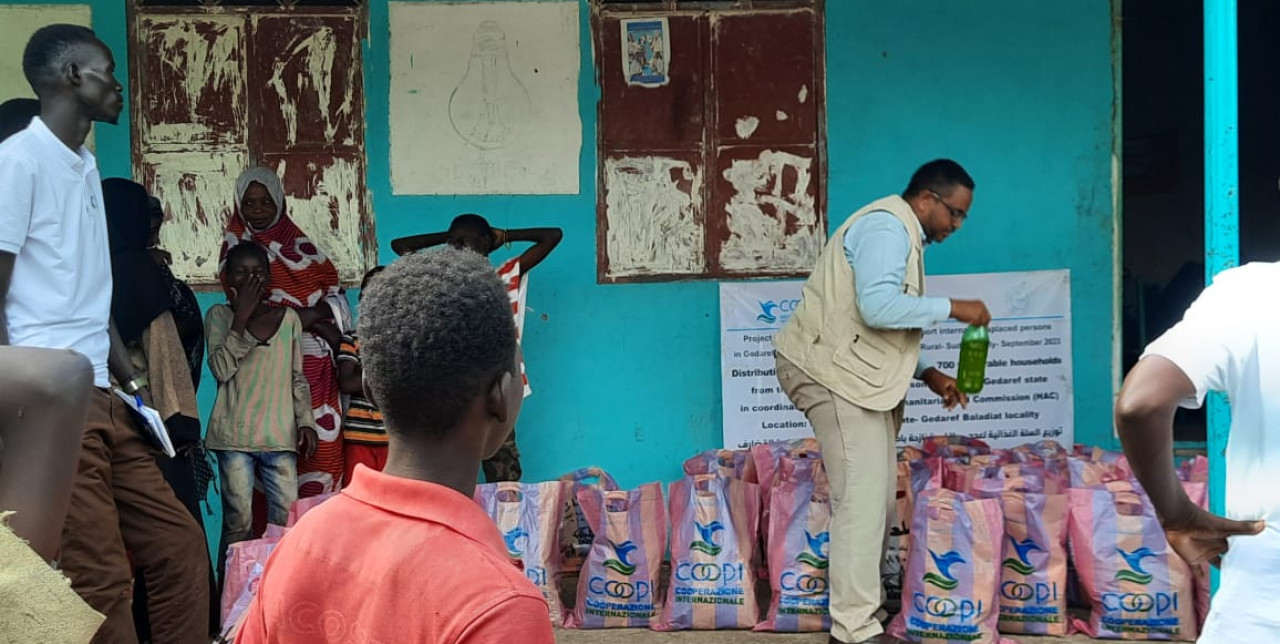21-09-2023 | di COOPI
Sudan. As the crisis deepens, NGOs warn of the cost of inaction and ask for more funding
Due to the current humanitarian crisis, the Sudanese people are facing unimaginable suffering and the slow pace of global response is a deep concern of the humanitarian sector. The Inter-Agency Working Group (IAWG) for the East and Central Africa, to whom COOPI – Cooperazione Internazionale adheres, is calling thus on the international community to respond urgently and comprehensively by providing flexible funding, by removing barriers to the provision of humanitarian aid, and by protecting civilians, aid workers, and health facilities.
Airstrikes and fighting are increasing day by day in the capital, Khartoum, in Kordofan, Blue Nile and Darfur, where reports of escalating inter-ethnic violence are also reported. Horrific cases of conflict-related sexual violence and other human rights violations are commonplace and collapse of the health system is generating increasing mortality. Children, in particular, have lost access to continuing education and are at risk of forced recruitment. IAWG warns that no other country in the world currently faces the same level of food insecurity: over 42% of the population (more than twenty million people) are now estimated to be facing crisis- or emergency-levels and 3.4 million children between six months and five years of age are bearing acute malnutrition, a major killer under the age of five. With the 2023 planting season having been disrupted due to the conflict and the price of staple foods increasing by up to 200%, from October the situation is expected to worsen.
The conflict has persisted for already five months, but the difficulties for NGOs do not end. Because of slow approvals, attacks and looting humanitarian organisations still face immense difficulties reaching with food, drinking water, medicines and seeds for farming the needing populations. Moreover, aid workers themselves remain the target of attacks, with 19 aid workers killed this year only. Despite all these challenges, since the start of the conflict, NGOs have been working across all 18 states in Sudan together with volunteer-led community neighborhood groups (commonly known as Emergency Response Rooms), who use to provide critical frontline assistance because they have been able to access areas international organisations are currently unable to get to.
Besides, inaction on this humanitarian crisis has also far-reaching consequences for regional stability and security. The conflict has driven enormous displacement both within Sudan - adding over 4 million people to the 3 million individuals that were already internally displaced before the start of the current conflict - and outside the Country. The one million people displaced into Chad, Egypt, South Sudan, Ethiopia, and the Central African Republic are putting in fact additional pressure on these neighbouring Countries, who face in some cases their own severely under-funded humanitarian crises. Limited resources are not enough for the reception of new Sudanese refugees and triggering social and political tensions are just around the corner.
Half of the Sudanese population (nearly 25 million people) is now in urgent need of assistance and the cost of not taking decisive action is too high not to be regretted. A priority and comprehensive action of the international community, including governments and international organisations, is much needed. The revised Sudan Humanitarian Response Plan, which aims to provide life-saving assistance and protection services to 18.1 million people, remains grossly underfunded, with only US$685.9 million received out of the US$2.6 billion required (or 26.7%). Additional bold and flexible funding from a diverse range of sources are necessary, to allow humanitarian organizations working on the ground to cover the increased cost of operating in such a dangerous and volatile environment, to find innovative ways to reach populations through the frontline community-led Emergency Response Rooms, and to support the rehabilitation of health and education facilities. The preservation of the human dignity should be as soon as possible the heart of the international commitment for Sudan and in the entire region.
The Inter-Agency Working Group is a regional coordination and advocacy platform of NGOs working in East and Central Africa on a comprehensive range of health issues. They are part of it: CARE, CONCERN Worldwide, COOPI – Cooperazione Internazionale, DRO – Danish Refugee Council, GOAL, Islamic Relief, International Rescue Committee, Mercy Corps, International Medical Corps, NRC – Norwegian Refugee Council, OXFAM, Plan International, Save The Children, World Vision.
For more information download the document below.




 Sudan
Sudan